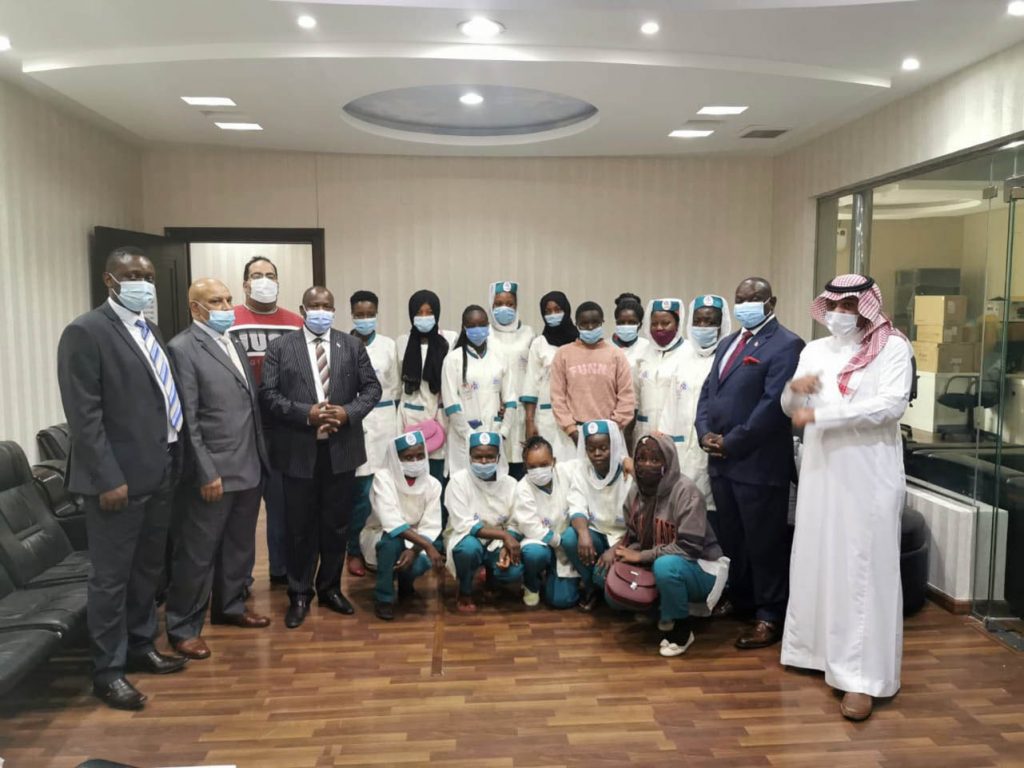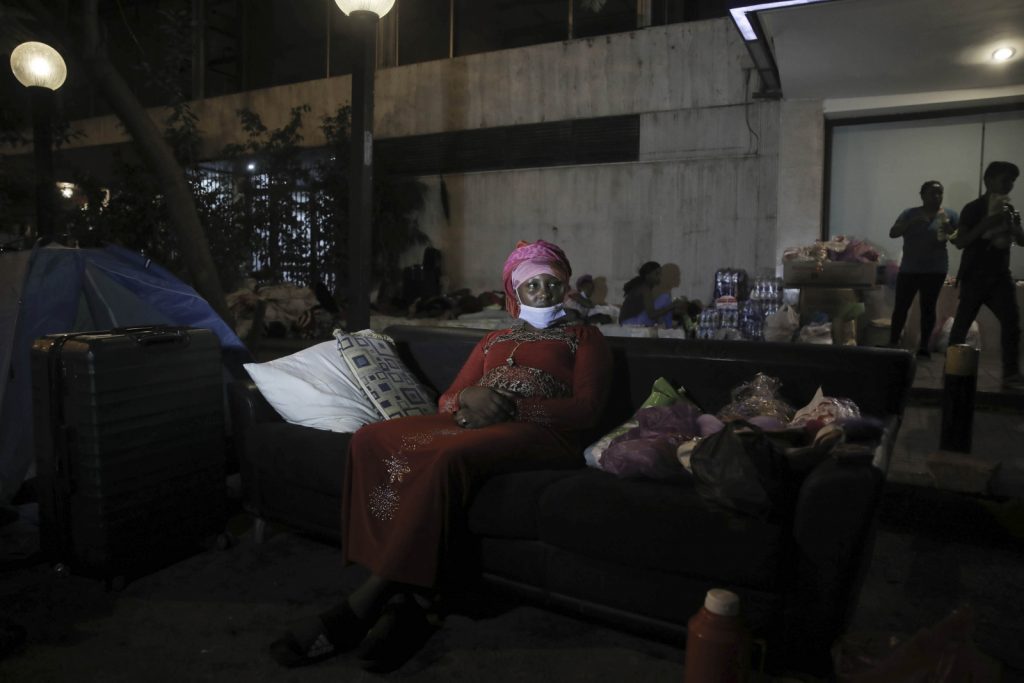Mary Wanjiru describes her horrific experience in Riyadh, Saudi Arabia.
Mary Wanjiru uses a wheelchair for mobility. That wasn’t the case a year ago when she boarded a flight from Nairobi to Riyadh, excited and optimistic. The mother of three got a job as a domestic worker in Saudi Arabia and with that the promise of greener pastures and a means to lift her family from abject poverty.
“I was happy that I would be able to provide for my family,” she told The Continent.
But things went wrong. For two months she didn’t get her salary and her employers punished her when she asked about it, taking away her phone and limiting her communication. They kept her passport and denied permission to change jobs.
Then her employer pushed her from the second-floor balcony of their apartment.
“I fell on my back and I was unable to stand or move my legs.” With a spinal injury and unable to walk, she was discharged after a month in hospital and sent back to Kenya with nothing.
Trading humans
Wanjiru had been employed under Saudi Arabia’s Kafala system, a framework through which either an individual or a company sponsors a foreigner to work in the country.
The system gives the employer extensive control over the employee. It also grants them the power to transfer the domestic worker to other employers. This has enabled the buying and selling of domestic workers openly on social media platforms.
On Twitter, for instance, several accounts advertise the sale and transfer of domestic workers of different nationalities, including Kenyans.
Some posts have the photograph of the worker, their details, salary and the cost of transfer. The accounts act as go-betweens and charge a commission for the service. All the posts are in Arabic and have the condition that negotiations are via private messages.
One of the accounts The Continent came across reads: “The commission is 500 riyals from each party owed by the sponsor and the client, transferred directly from the sponsor. I do not deal with offices or marketers, I communicate in private.”
Despite this information filtering back home, the lack of jobs and the promise of lucrative opportunities has been driving Kenyans to seek employment abroad. According to World Bank data, Kenya’s unemployment rate has steadily risen, going from 2.8% in 2016 to 5.7% in 2021.
Together with the rising cost of living, this has prompted young women to seek domestic work in Saudi Arabia, some of whom were unaware of the danger that awaits them.
Data from the labour ministry says there are around 400 000 Kenyan migrant workers in the Gulf, of which 210 000 are in Saudi Arabia.
Additionally, according to the Central Bank of Kenya, Saudi Arabia is the third-highest source of remittance inflows to Kenya after the US and UK; some $185-million came in from Saudi Arabia in 2021 alone.
Mark Bichachi, a communication strategist and political analyst, believes this money makes it hard for the Kenyan government to confront the Saudi Arabian government on the reported abuses.
This was evident recently when, on the back of new allegations of mistreatment of a Kenyan domestic worker, the Kenyan Embassy in Riyadh thanked the Saudi government for providing Kenyans with opportunities. Foreign affairs principal secretary Macharia Kamau said: “It is a huge boon for our economy and for our diaspora remittances.”
Downplaying the wider problem, Kamau blamed the situation on the nature of Kenyan women, saying that working in Saudi Arabia required them to be meek, a characteristic not shared by Kenyan domestic workers.
“Sometimes our people will not be so subservient, and when they go to countries like Saudi Arabia there are traditions around housework that are very ancient,” he said.
Speaking to elected officials during a training session, Kamau said they needed to be careful how they deal with the problem so that Kenya does not destroy the huge opportunity that has provided jobs for hundreds of thousands of Kenyans in various countries in the Middle East.
“We no longer have this problem of deaths and abuse with the others but we are struggling with Saudi Arabia.”
The Saudi embassy in Nairobi did not respond to a request for comment. A few weeks ago, after allegations of yet another case of a Kenyan domestic worker being abused in the country, it released a statement denying the allegations and addressing the issue for the first time.
“The embassy affirms the kingdom’s keenness to protect full rights of residents living on its lands of various nationalities, and that the laws followed in the kingdom are strict towards any practices that violate human dignity, whoever they were.”
Kenya’s labour ministry says it supports a temporary ban on export of domestic workers and low-skilled labour to Saudi Arabia: “Considering the rising number of cases of abuse and reported deaths of Kenyan migrant workers, coupled with the adverse publicity for the ministry and government in general, it appears the most viable option for now.”
The ministry previously said it would create two safe houses in Saudi Arabia for distressed Kenyan migrant workers. It also said it enjoys a cordial bilateral relationship with the kingdom and is reviewing bilateral agreements to safeguard workers.
The Philippines took similar action in 2021 when it suspended the deployment of workers to Saudi Arabia. The suspension was lifted this month after the two governments had bilateral talks on how to improve and protect Filipinos working in Saudi Arabia.
 His Excellency the Ambassador today in Qassim region welcomed the first batch of post-COVID-19 Domestic Workers coming to the Kingdom from Kenya. The workers came through Alherabi Recruitment Agency, based in Saudi Arabia.
His Excellency the Ambassador today in Qassim region welcomed the first batch of post-COVID-19 Domestic Workers coming to the Kingdom from Kenya. The workers came through Alherabi Recruitment Agency, based in Saudi Arabia.
A necessary evil
For Faith Murunga, travelling to Saudi Arabia for domestic work was a necessary evil. She had seen stories of Kenyan women suffering in the country but needed a job to provide for her six children. Murunga says her mistreatment began on the second day, when she was forced to work in three different houses of her employer’s extended family.
When she raised the issue with her boss, he beat her, increased her workload and started denying her food.
“My life became tough because for any slight misunderstanding, the wife reported to her husband for him to beat me.” Those beatings became regular, but Murunga decided to focus on earning that crucial income.
But then she got sick. Her employer gave her painkillers and ordered her back to work. She planned her escape that night and sought refuge in a police station. However, the police called her employer to pick her up.
“They told him to take me back to the agency to solve our differences,” Murunga said.
When they got home, Murunga went to her bedroom and was packing her belongings when her employer came in, pushed her against the wall and rained blows on her. He then dragged her into the kitchen and ordered her to cook.
She says she was standing in the kitchen in a state of shock when her employer’s wife walked in. “She called her husband who came in shouting, picked up the kettle that was boiling water and threw it at me.”
Murunga’s prominent scars are a testament to what she went through in Saudi Arabia.
Wanjiru and Murunga survived their ordeals but many other women who got jobs in Saudi Arabia did not.
 Taking a stand: A Kenyan woman stages a protest in Lebanon demanding to be repatriated. Young women who seek employment worldwide as domestic workers are vulnerable to abuse. Photo: Elsie Haddad/Getty Images
Taking a stand: A Kenyan woman stages a protest in Lebanon demanding to be repatriated. Young women who seek employment worldwide as domestic workers are vulnerable to abuse. Photo: Elsie Haddad/Getty Images
Cardiac arrest — never torture
According to the ministry of foreign affairs, 89 Kenyans have died in Saudi Arabia in the past two years.
The cause for most of the deaths is reported to be suicide, cardiac arrest and natural causes. This has raised doubts even in Kenya’s ministry of foreign affairs, saying “it is not possible that these young people are all dying of cardiac arrest”.
Autopsies conducted in Kenya suggested that torture and other human rights abuses have taken place.
Families of victims have rejected death certificates from Saudi Arabia authorities that claim death by suicide. One such family is that of 23-year-old Carolyne Aluoch, whose naked body was found in the bathroom of a hospital. Saudi Arabian authorities said that she had committed suicide, but for her brother Stephen something did not add up.
“She called me earlier informing me that she was being mistreated.”
The Continent spoke to families who recounted the same pattern of abuse and then disappearance, followed by claims that their loved one had died in any way except murder.
In one case, an autopsy conducted in Kenya revealed signs of ligament strangulation, likely coming from a rope, and the woman’s eyes had been gouged out. Her body had multiple burn marks and there was clear evidence of under-nourishment.
As far as The Continent can tell, not one person has been prosecuted for any crimes related to these deaths.
This article first appeared in The Continent, the pan-African weekly newspaper produced in partnership with Mail & Guardian. It is designed to be read and shared on WhatsApp. Download your free copy here.
The views expressed are those of the author and do not necessarily reflect the official policy or position of the Mail & Guardian.